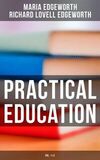

Practical Education (Vol.1&2)
Pagine: 513
"Practical Education" is an educational treatise written by Maria Edgeworth and her father Richard Lovell Edgeworth. It is a comprehensive theory of education that combines the ideas of philosophers John Locke and Jean-Jacques Rousseau as well as of educational writers such as Thomas Day, William Godwin, Joseph Priestley, and Catharine Macaulay. The Edgeworths' theory of education was based on the premise that a child's early experiences are formative and that the associations they form early in life are long-lasting. They also encourage hands-on learning and include suggestions of "experiments" that children can perform and learn fun. In Edgeworths' work, the attention of the child appears as a key site for pedagogical work and interventions. Following Locke's emphasis on the importance of concrete language over abstract, the Edgeworths' argued that words should clearly indicate "distinct ideas". This contributed to what Romanticist Alan Richardson calls "their controversial positions", including their resistance to reading fairy tales to children or discussing religion with them.
Contents:
Toys
Tasks
On Attention
Servants
Acquaintance
On Temper
On Obedience
On Truth
On Rewards and Punishments
On Sympathy and Sensibility
On Vanity, Pride, and Ambition
Books
On Grammar and Classical Literature
On Geography and Chronology
On Arithmetic
Geometry
On Mechanics
Chemistry
On Public and Private Education
On Female Accomplishments, &c.
Memory and Invention
Taste and Imagination
Wit and Judgment
Prudence and Economy
Summary
Notes, containing Conversations and Anecdotes of ChildrenMaria Edgeworth (1768-1849) was a prolific Anglo-Irish writer of adults' and children's literature. She was one of the first realist writers in children's literature and was a significant figure in the evolution of the novel in Europe. She held views on estate management, politics and education, and corresponded with some of the leading literary and economic writers, including Sir Walter Scott and David Ricardo.
Richard Lovell Edgeworth (1744-1817) was an Anglo-Irish politician, writer and inventor. A Trinity College and Corpus Christi alumnus, he is credited for creating, among other inventions, a machine to measure the size of a plot of land. He also made strides in the developing educational methods. Edgeworth sat in Grattan's Parliament from 1798 until the Act of Union in 1801, and advocated Catholic Emancipation and parliamentary reform. He was a founder-member of the Royal Irish Academy.
Pubblicato da: Musaicum Books
Come funziona?
Crea un account.
Crea il tuo account gratuito qui.
Scarica l'app Voxa
Disponibile per Android e iPhone su Google Play o su App Store.
Prova gratuita per 7 giorni
Hai accesso a 100.000 titoli e all'intera esperienza Voxa.
Ascolta offline
Scarica i tuoi audiolibri preferiti e goditeli anche senza connessione a Internet.

